What’s happening in Gaza?
The situation in Gaza is fast-moving and at times confusing. Here's what's happening, and what you can do to help.
Latest updates from Gaza
- Israel has breached the temporary ceasefire agreement that came into effect in January. The military has resumed airstrikes across Gaza, killing over 400 people and injuring hundreds more.
- Gaza is once again under a full siege - all food, fuel, and humanitarian aid has been cut off.
- Israel has cut electricity to Gaza’s main desalination plant that supplied clean water to around 500,000 people.
- There continue to be significant challenges in distributing aid, due to extensive infrastructure damage, and the new laws restricting UNRWA from operating.
- Gaza's medical system is struggling to cope with the rising number of casualties and hospitals are critically low on supplies.
Last updated: 18 March 2025
How can you help Gaza?
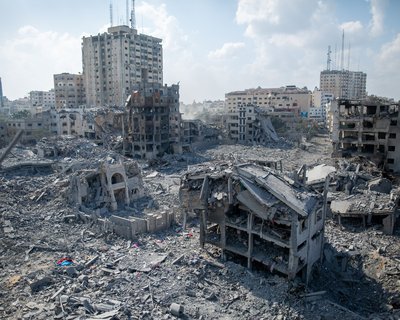
Permanent ceasefire now
Call for a permanent ceasefire, unrestricted humanitarian access and a path to justice.
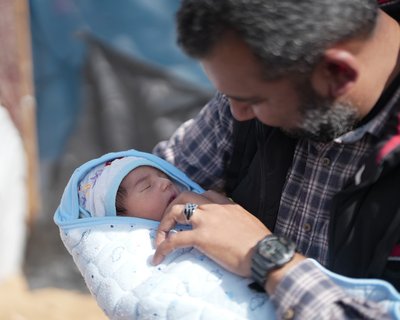
Gaza-Lebanon Appeal
Please donate today to support people who have lost everything in this crisis.
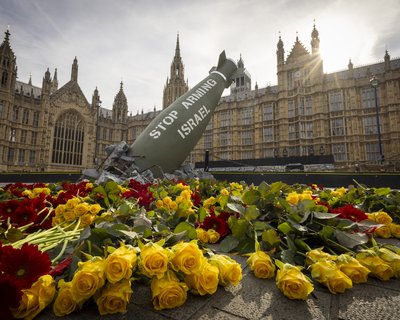
Stop arming Israel
The UK government must stop being an ally to Israel's atrocities. Demand an end to their complicity.
How many people have died in Gaza?
- The Israeli military has killed at least 48,000 Palestinians in Gaza during this crisis.
- Some estimates suggest that the Gaza death toll is much higher than the reported figures.
- At least 11,000 people are reportedly missing under the rubble.
- Over 110,000 have been wounded, many with life-changing injuries.
Can aid get into Gaza?
Gaza has been under Israeli blockade for 17 years. Israel controls all sea, air and land access to Gaza.
- Israel has repeatedly and deliberately blocked life-saving essentials from entering Gaza, in an act of collective punishment against Palestinians.
- Israel has targeted and destroyed aid infrastructure, including warehouses and storage sites. This continues to present significant challenges in getting aid to all those who are in need.
- Israel has passed a law to ban UNRWA - the biggest and most established aid agency in Gaza - from operating. This is part of Israel’s systematic destruction of aid infrastructure and response in Gaza.
- Over 300 humanitarian workers have been killed by the Israeli military, including water engineers working with Oxfam partners.
Despite the huge obstacles that remain, our colleagues and partners are working relentlessly to support people in their communities, often risking their lives.
How much food is getting into Gaza?
- All of Gaza is at risk of famine, and children are already dying from malnutrition.
- Israel has been using starvation as a weapon of war against Palestinians in Gaza.
- Crops, farms and fishing fleets have been destroyed. Many livestock have died of starvation.
- The price of food has increased dramatically. More than half the households in Gaza have been forced to sell their clothes to afford food.
“It is a crime against humanity for a country to unleash starvation upon a population.”
- Oxfam’s Middle East Director Sally Abi Khalil
How much clean water is available in Gaza?
Over 2 million people are currently struggling to survive without access to clean water.
- Israel is using water as a weapon of war in Gaza.
- The Israeli military has caused devastating damage to more than 80 per cent of water and sanitation infrastructure.
- This is having a dire impact on health. People are falling severely ill from easily preventable diseases like diarrhoea and jaundice.
Are there any hospitals left in Gaza?
The health system has been decimated across Gaza.
- All hospitals have been damaged, and have limited access to fuel, medical supplies and clean water.
- Almost 1000 health workers have been killed by the Israeli military.
- Those most at risk are people with disabilities, pregnant women or new mothers, those recovering from injuries, and people with chronic illnesses or weakened immune systems.
Where are people living in Gaza?
- Israeli airstrikes and bombardment forced nearly 2 million people – over 90% of the population – to flee their homes.
- Repeated evacuation orders forced families to keep moving to ever-shrinking “safe zones”, which the Israeli military repeatedly attacked. Forced relocation of a civilian population, without guarantees of safety or safe return, is a serious violation of international law.
- Almost 90% of residential buildings have been damaged. Many people are now returning to their homes to find them turned into rubble.
- People are sheltering in overcrowded schools, mosques, tents, and makeshift shelters - with limited access to water, food, hygiene, and health services.
Voices from Gaza
What is the war on Gaza about?
On 7 October 2023, Hamas and other armed Palestinian groups carried out attacks on civilians in Israel. More than 1,200 people were killed, and 240 people were taken hostage. Around 100 people currently remain hostage in Gaza.
The Government of Israel responded by launching airstrikes and ground attacks in Gaza, which continue to this day, resulting in catastrophic death and injuries to civilians. Israel also implemented a “total siege” on 9 October 2023, stopping all supplies of food, water and fuel from entering Gaza.
For 58 years the Israeli military has occupied Palestinian territory, including Gaza, the West Bank, and East Jerusalem. Israel has also imposed a blockade on Gaza for the last 17 years.
This has devastated Gaza’s economy, left most people unable to leave Gaza, restricted access to essential services such as healthcare, and cut Palestinians off from each other. Even before October 2023, almost 80% of people in Gaza already relied on aid to survive.
Military force cannot resolve this decades-long conflict. Palestinians and Israelis need and deserve a lasting peace, with justice and accountability.
What is Oxfam doing in Gaza?
Oxfam has worked in the Occupied Palestinian Territory and Israel since the 1950s.
We have supported communities in Gaza, the West Bank and East Jerusalem, to tackle the root causes of conflict, build resilience, and protect people’s rights.
Oxfam staff member Ghada Alhaddad collects notes and reflections from people in the Al-Mawasi area. Photo: Alef Multimedia/Oxfam.
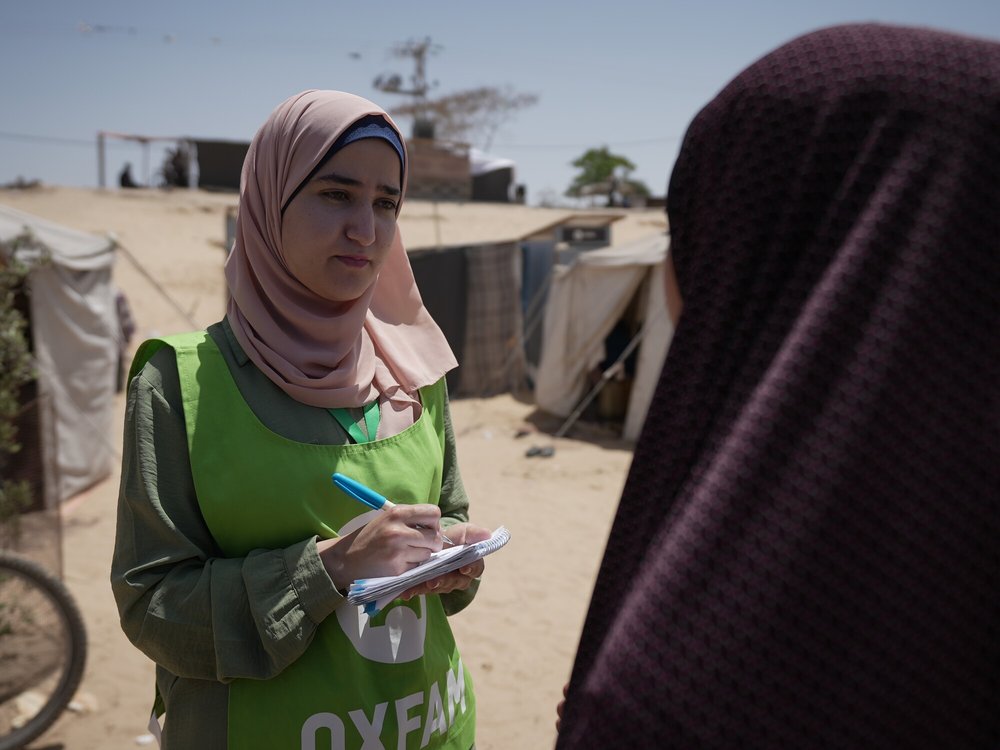
Oxfam staff member Ghada collects notes and reflections from people in the Al-Mawasi area. Photo: Alef Multimedia/Oxfam.
The Israeli military bombardment, destruction of infrastructure, and restriction on goods entering Gaza, has made a full-scale humanitarian response extremely difficult.
Despite huge obstacles, Oxfam staff and partners are responding as best they can and desperately waiting to scale up their humanitarian work as soon as more aid is allowed in.
Credit: Alef Multimedia/Oxfam
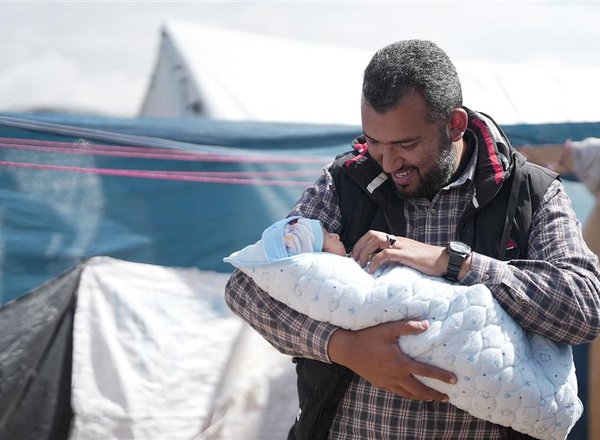
Emergency appeal
Donate to Gaza and Lebanon
What needs to happen now?
- A permanent ceasefire
- Unrestricted access to humanitarian aid
- The UK must stop all arms sales to Israel
- Accountability under international law
- A lasting and just peace
A permanent ceasefire
The international community, including the UK, must use all political and economic tools at their disposal to help secure a permanent ceasefire. And to ensure the release of all remaining hostages held by Hamas in Gaza, and illegally detained Palestinians in Israel.
Unrestricted access to humanitarian aid
Enough food, clean water, medical supplies, and other essential items must be allowed to reach those who need it.
According to International Humanitarian Law, as the occupying power, Israel must ensure the humane treatment of the population and provide for their basic needs.
The UK must demand Israel to repeal recent laws banning UNRWA and ensure it can lead aid efforts in Gaza.
The rapid reconstruction of Gaza must follow. Palestinians must be empowered to lead their own recovery. The international community must support that process by holding Israel accountable, and committing significant funding to rebuilding efforts.
Donate to Gaza-Lebanon appeal.
The UK must stop all arms sales to Israel
The immense suffering Israel has inflicted on Gaza has happened under the watch and protection of world leaders, including the UK.
The UK Government has been complicit in this crisis by still allowing most arms sales, even though they have admitted that Israel’s actions may have violated international law.
There is an ongoing risk of further violations of international law. The Government must still immediately suspend all remaining arms licences – including those for parts of the deadly F-35 fighter jets.
Accountability under international law
All parties must be held to account for violations of international law committed during this conflict, to ensure justice for the victims and to deter future violations.
The International Court of Justice (ICJ) found that Israel’s acts could pose a risk of genocide, and ordered six measures for Israel, including ensuring enough aid reaches Palestinians in Gaza.
The UK Government must not continue to be an ally to Israel’s atrocities. It must end its complicity. To continue shielding Israel from accountability is to abandon the principles of justice and human rights that it claims to uphold.
A lasting and just peace
True justice and lasting peace will not be possible without addressing the root cause of this conflict - Israel’s ongoing oppression of Palestinians.
There must be an end to the blockade of Gaza, and to the occupation of Palestinian territory – Gaza, the West Bank and East Jerusalem. The ICJ has ruled Israel’s ongoing occupation as illegal.
Everyone deserves to live in freedom, with dignity and self-determination.
Find out more
- For more updates on the situation, visit the UN OCHA website.
- Stay informed with Oxfam's responses to the latest escalations in Gaza.
- Find out more ways you can help Gaza.